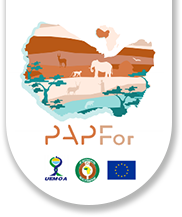Home / News / Stakeholders agree ‘Call to Action’ to prevent deforestation from cocoa (...)
Stakeholders agree ‘Call to Action’ to prevent deforestation from cocoa farming
Stakeholders representing government agencies, conservation partners, the private sector and agricultural experts have drafted a ‘Call to Action’ for forest protection and conservation in the West African cocoa sector, following a workshop held in Monrovia, Liberia, in May 2023. The initiative aims to reconcile cocoa production with ongoing conservation efforts in forested landscapes across West Africa.
The Call to Action seeks to address the challenges faced by governments and landowners in the region by balancing the expansion of the cocoa sector with forest protection. It is a joint initiative of the USAID-funded West Africa Biodiversity and Low Emissions Development Programme (WABiLED) and the EU-funded Support Programme for the Preservation of Forest Ecosystems in West Africa (PAPFor), which organised a workshop in May, and addresses regional and state actors as well as partners working in the landscapes affected. The government agencies represented include Liberia’s Forestry Development Authority, Liberia Land Authority, Ministry of Agriculture of Liberia, the Ivoirian Office of Parks and Reserves and the Society for the Development of Forests (SODEFOR) of Côte d’Ivoire. Participants also included research centres and representatives of the private sector, as well as local NGOS.
Regional actors are encouraged to:
- Enhance collaboration on issues related to cocoa farming and the growth of immigrant cocoa farmers, and work closely with local embassies under the auspices of the ECOWAS parliament.
- Maintain regular dialogue with governments on the issue of cocoa and forest coexistence is needed, and develop regional guidelines and actions for cocoa-producing ECOWAS Member States
- Consider adopting a regional instrument, guidelines and action plans to promote the maintenance of a forest cover rate of 30-40 % greater than cocoa plantations.
Landscape-level actors, for their part, are called to:
- Develop and operationalise land-use plans and related governance mechanisms to ensure the sustainable cultivation of cocoa that does not affect the forest and wildlife, and to respect permanent forests including in protected areas, classified forests and community forests.
- Work with farmers to halt cultivation in classified forests and end illegal activities while providing alternative support.
- Establish a registry of farmers and cocoa plantations and organise full traceability of cocoa production down to individual plots.
- Apply participatory approaches in PAPFor landscapes to create landscape management committees.
- Enable management committees to ensure the provision of a decent income for cocoa farmers and farm workers to promote fair trade and bean-to-bar approaches.
- Apply a rights-based approach to strengthening community forests and empower local communities for sustainable forest conservation and to develop other value chains.
- Promote the planting of high-yielding cocoa varieties, use of best-practice-recommended shade levels and the application of environmentally friendly fertilisers and/or manure to promote higher yields per unit area.
- Integrate farmers’ knowledge into agroforestry schemes by establishing training programmes for farmers based on sustainable practices adapted to the local context.
- Promote the regeneration of aging cocoa plantations with agroecological and climate-smart techniques, as well as the integration of tree legumes in agroforestry systems.
At the national level, actors should:
- Ensure that there are sound policies for the planning, control and management of inward migration flows including policies related to migration and land tenure.
- Promote sustainable legislation and best practices for cocoa production and raise awareness about the land areas eligible for cocoa farming.
- Support the readiness of the cocoa-producing countries for the implementation of the EU Deforestation Free Commodity Regulation and the current African Regional Standard (ARS) scheme and adapting national laws to these standards where needed.
- Formulate, adopt and promote the implementation and enforcement of relevant policies, laws, and regulations on good agricultural practices.
- Use relevant policy, regulatory and administrative measures to promote a forest cover rate of 30 to 40% greater than the area under cocoa plantations.
- Adopt and implement favourable policy and regulatory measures to value non-timber forest products and their sustainable management.
- Promote the regeneration of ageing cocoa plantations using agroecological and climate-smart techniques integrating tree legumes in agroforestry systems.
Meanwhile, WABiLED and PAPFor have agreed to support cocoa-producing countries in West Africa to adhere to the African Regional Standards ARS1000 on sustainable cocoa production and move towards compliance with the new EU Regulation against Imported Deforestation. These efforts may require the adaptation of national laws in some instances. Through continued collaboration and the implementation of innovative practices, the region can secure a thriving cocoa sector while conserving forests and biodiversity.

